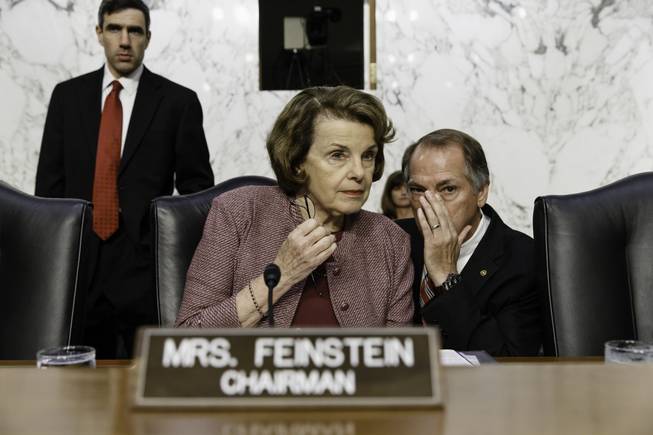
J. Scott Applewhite / AP
Senate Intelligence Committee Chair Sen. Dianne Feinstein, D-Calif. prepares to hold a hearing on reforming the practice of bulk collection of telephone records by the National Security Agency and other government agencies, Thursday, June 5, 2014, on Capitol Hill in Washington.
Monday, Sept. 22, 2014 | 10:07 a.m.

Harry Reid
Editor's note: This is part of a weekly series, Senate Showdown, in which the Las Vegas Sun politics team shares news, links and insights on Nevada Sen. Harry Reid and the 2014 battle for the U.S. Senate. Readers can also submit questions at [email protected] or via Twitter using the hashtag #AskAmber.
In six weeks, Nevada Sen. Harry Reid will know if he will still run the U.S. Senate.
The campaign to control the Senate is the defining storyline of American politics in the Nov. 4 election, and Reid is one of the main characters.
Forecasts predict Republicans could have a slight majority in the Senate. An unpopular Democratic president and the first national election since the 2013 implementation of Obamacare helped create a tough environment for Senate Democrats up for reelection in red states.
If Republicans gain a net six seats, they would control both chambers of Congress for President Barack Obama's last two years in office. And Reid would lose control of the Senate after ascending to majority leader in 2007.
But six weeks is a long time in politics.
Neither Reid nor Republican Nevada Sen. Dean Heller are up for re-election this year. But the Las Vegas Sun politics team will share links and insights on the Senate showdown leading up to the election.
The women effect:
There are a record 20 female U.S. senators, and women lead the body's negotiations on budget, spending, agriculture, environment and more. But 16 female senators are Democrats, meaning if Republicans take the Senate in the fall, women will lose much of their standing in leadership. Donovan Slack of USA Today analyzes what that would mean for legislation, leadership and overall bipartisanship.
Harry Reid's money machine:
Reid and his party campaign against big money in politics, even as a super PAC connected to him is the biggest spender of its kind this election cycle. Matea Gold of The Washington Post reports that the outside spending group Senate Majority PAC, led by top former Reid aides, is collecting checks from billionaires and labor unions to give outside conservative groups a run for their money in races that could determine control of the Senate.
End of a dominate era:
The era of a party holding its majority in the Senate for decades — even just one — is gone, replaced by one of partisanship and volatility. That's the argument National Journal editor Ronald Brownstein makes, pointing out that since 1980, neither party has held onto leadership for more than eight years in a row.
Build your own Senate forecast:
Every few days, statistic-driven forecasting models like those from The New York Times, The Washington Post and FiveThirtyEight update their predictions on which party will control the Senate. (Republicans vary from having a slight edge to being the favorites.) But interactive tools like this one and this one let you build your own forecasting model, choosing whether you think a Senate election in a particular state will be a Republican sweep, Democratic wave or somewhere in the middle.

Join the Discussion:
Check this out for a full explanation of our conversion to the LiveFyre commenting system and instructions on how to sign up for an account.
Full comments policy